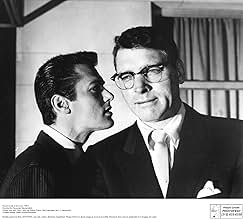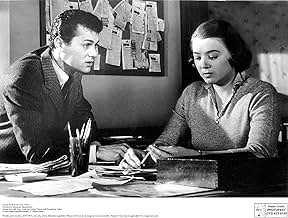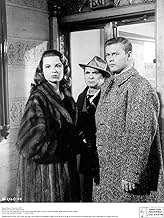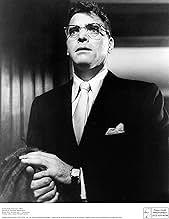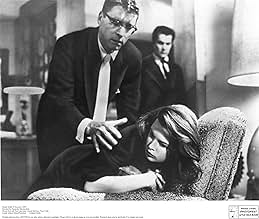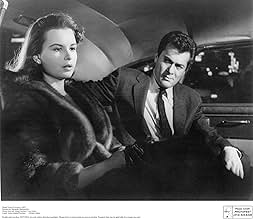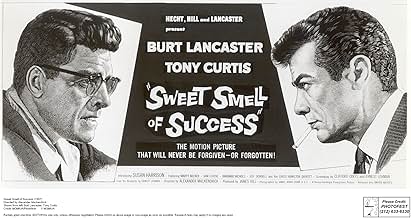VALUTAZIONE IMDb
8,0/10
38.518
LA TUA VALUTAZIONE
Il potente editorialista di Broadway J.J. Hunsecker costringe Sidney Falco, agente stampa senza scrupoli, a rompere la storia d'amore di sua sorella con un musicista jazz.Il potente editorialista di Broadway J.J. Hunsecker costringe Sidney Falco, agente stampa senza scrupoli, a rompere la storia d'amore di sua sorella con un musicista jazz.Il potente editorialista di Broadway J.J. Hunsecker costringe Sidney Falco, agente stampa senza scrupoli, a rompere la storia d'amore di sua sorella con un musicista jazz.
- Regia
- Sceneggiatura
- Star
- Nominato ai 1 BAFTA Award
- 3 vittorie e 3 candidature totali
Martin Milner
- Steve Dallas
- (as Marty Milner)
Chico Hamilton
- Self
- (as The Chico Hamilton Quintet)
Buddy Clark
- Self
- (as The Chico Hamilton Quintet)
Jay Adler
- Manny Davis
- (non citato nei titoli originali)
Mary Bayless
- Bar Patron
- (non citato nei titoli originali)
Nicky Blair
- Patron at Toots Shor's
- (non citato nei titoli originali)
Nick Borgani
- Waiter
- (non citato nei titoli originali)
Recensioni in evidenza
Tony Curtis learns the hard way about the "Sweet Smell of Success" in this 1957 film that stars Burt Lancaster, Sam Levene, Susan Harrison, and Barbara Nichols. In the pre-Internet days when the newspaper was king, the columnists ruled - Winchell, Ed Sullivan, Cholly Knickerbocker, Radie Harris, and let's not forget Hedda and Louella! But the King was Winchell, and while I don't think the Burt Lancaster character of J.J. Hunsecker is modeled on him, the power and control the man wielded certainly is.
Tony Curtis plays one of his best roles as Sidney Falco, a low-ranking press agent who is dependent on people like Hunsecker to mention his clients in their daily columns. But Sidney is on the outs with Hunsecker, a very bad place to be. Hunsecker has ordered Sidney to break up his sister Susan's relationship with a jazz musician, Steve (Martin Milner), and Susan is still seeing him. Sidney comes up with a plan to tear the two apart which probably would have worked, but when Steve stands up to J.J., Hunsecker is out for blood. He demands the plan be taken one step further and dangles an attractive carrot in front of Sidney to make it happen.
Done in black and white with most of the action taking place at night and often on the streets of Times Square, "The Sweet Smell of Success" has an atmosphere of slime and grit. The handsome Lancaster and Curtis are not particularly well photographed - it's not meant to be a glamorous picture. The dialogue is fast, to the point, and witty and the performances are breathtaking. Lancaster underplays the twisted Hunsecker so that his contempt for the people he writes about - and his sick attraction to his sister - can be clearly shown. He could have played it more along the lines of Curtis' Sidney - an obvious, manipulative rat - but it wouldn't have been as right as Lancaster's tightly-controlled J.J.
Curtis was born to play Sidney - an attractive, fast-talking man with no morals who plays both ends against the middle. He's a New York character, ideal for a New York guy like Curtis who grew up on the streets. Sidney is totally outrageous - he invites a cigarette girl to his apartment and then pimps her out to a columnist so he can get an item in his column; he tries blackmailing another columnist, but that backfires. It doesn't stop him from trying again.
The two victims of these piranhas are Susan and Steve, a young couple deeply in love who want to be married. Their simple story is told against a backdrop of scandal, revenge, manipulation and blackmail. Their situation makes the actions of J.J. and Sidney even seedier and more cruel than they already are.
"Sweet Smell of Success" has become a cult classic and was actually mounted at one point as a Broadway musical. Like "Nightmare Alley," it probably was too grim for audiences back then. Is anything too grim for audiences of today? Doubtful.
Tony Curtis plays one of his best roles as Sidney Falco, a low-ranking press agent who is dependent on people like Hunsecker to mention his clients in their daily columns. But Sidney is on the outs with Hunsecker, a very bad place to be. Hunsecker has ordered Sidney to break up his sister Susan's relationship with a jazz musician, Steve (Martin Milner), and Susan is still seeing him. Sidney comes up with a plan to tear the two apart which probably would have worked, but when Steve stands up to J.J., Hunsecker is out for blood. He demands the plan be taken one step further and dangles an attractive carrot in front of Sidney to make it happen.
Done in black and white with most of the action taking place at night and often on the streets of Times Square, "The Sweet Smell of Success" has an atmosphere of slime and grit. The handsome Lancaster and Curtis are not particularly well photographed - it's not meant to be a glamorous picture. The dialogue is fast, to the point, and witty and the performances are breathtaking. Lancaster underplays the twisted Hunsecker so that his contempt for the people he writes about - and his sick attraction to his sister - can be clearly shown. He could have played it more along the lines of Curtis' Sidney - an obvious, manipulative rat - but it wouldn't have been as right as Lancaster's tightly-controlled J.J.
Curtis was born to play Sidney - an attractive, fast-talking man with no morals who plays both ends against the middle. He's a New York character, ideal for a New York guy like Curtis who grew up on the streets. Sidney is totally outrageous - he invites a cigarette girl to his apartment and then pimps her out to a columnist so he can get an item in his column; he tries blackmailing another columnist, but that backfires. It doesn't stop him from trying again.
The two victims of these piranhas are Susan and Steve, a young couple deeply in love who want to be married. Their simple story is told against a backdrop of scandal, revenge, manipulation and blackmail. Their situation makes the actions of J.J. and Sidney even seedier and more cruel than they already are.
"Sweet Smell of Success" has become a cult classic and was actually mounted at one point as a Broadway musical. Like "Nightmare Alley," it probably was too grim for audiences back then. Is anything too grim for audiences of today? Doubtful.
BURT LANCASTER was at the height of his illustrious film career when he played J.J. Hunsecker, the Broadway gossip columnist who dipped his pen in poison to destroy careers. TONY CURTIS was a long way from the days when he was ridiculed for saying "Yonda is the castle of my fadder" in films like SON OF ALI BABA and THE BLACK SHIELD OF FALWORTH.
Here, Curtis is every bit up to the chore of playing the slavishly obedient but hateful publicity man who seems to be fawning over Lancaster, but really despises him. Two towering performances in a film with some of the sharpest exchanges of dialog ever heard.
The cruel side of show biz gets full and rich observation from screenwriter Clifford Odets from a novel by Ernest Lehman. The bright lights of Broadway play against the rainswept streets of Broadway and Times Square, a shadowy sort of film noir background for the brutal story being told.
The story abounds in quotable moments, such as when Lancaster tells Curtis, "You're a cookie full of arsenic." The jazz score background sets the appropriate mood for a story as cynical as this, and the twists and turns of the plot will keep you hooked until the uncertain ending. The main plot line has Lancaster opposed to his sister's suitor, a jazz musician (MARTIN MILNER) and his efforts to get this man out of his sister's life with the help of his obedient slave.
But mainly, this is a film worth savoring to watch the intense performances of Lancaster and Curtis. I doubt whether either of them has ever done better work. For Lancaster, it only cemented his reputation as a man already judged to be a fine actor in the right role. For Curtis, it made film critics take this "pretty boy from Brooklyn" seriously for the first time and was the first big milestone in his budding film career.
Here, Curtis is every bit up to the chore of playing the slavishly obedient but hateful publicity man who seems to be fawning over Lancaster, but really despises him. Two towering performances in a film with some of the sharpest exchanges of dialog ever heard.
The cruel side of show biz gets full and rich observation from screenwriter Clifford Odets from a novel by Ernest Lehman. The bright lights of Broadway play against the rainswept streets of Broadway and Times Square, a shadowy sort of film noir background for the brutal story being told.
The story abounds in quotable moments, such as when Lancaster tells Curtis, "You're a cookie full of arsenic." The jazz score background sets the appropriate mood for a story as cynical as this, and the twists and turns of the plot will keep you hooked until the uncertain ending. The main plot line has Lancaster opposed to his sister's suitor, a jazz musician (MARTIN MILNER) and his efforts to get this man out of his sister's life with the help of his obedient slave.
But mainly, this is a film worth savoring to watch the intense performances of Lancaster and Curtis. I doubt whether either of them has ever done better work. For Lancaster, it only cemented his reputation as a man already judged to be a fine actor in the right role. For Curtis, it made film critics take this "pretty boy from Brooklyn" seriously for the first time and was the first big milestone in his budding film career.
Press freedom is one of the best thing in any democratic society but it may sometimes produce/bring lies used for the advantage of powerful groups and/or circles. That is why this film was called in some Latin American countries "A Damn Lie". The excellent plot shows how someone arrogant, selfish, good writing and talking as J.J. Hunsecker (Burt Lancaster) was able to use various factors in the society he did his work in order to destroy any enemy, any adversary or any person whom he did not like at all. An example was the boy friend of his sister Susan, a working young man, devoted to music and strongly in love with Susan, completely discredited by JJ. Certainly JJ was a kind of a sick man, unable to accept any reason from any other person. He was born to have adversaries and not friends. To do all his work JJ needed snakes (not persons) as Sidney Falco (Tony Curtis), who behaved worse than a reptile, always praising JJ although he in fact hated him and creating the intrigues whenever there were necessary. Very good film and probably a lesson, the acting was also excellent, particularly of Lancaster as a tough columnist JJ and Tony Curtis as a low ethic man.
10twm-2
**MILD SPOILERS** It is amazing the number of different ways a great film can weave its alluring web and pull you into its story. Of my 100 favorite films, this one's journey into that rarefied status is unique, based on but a single viewing. I saw "Sweet Smell of Success" when I was too young to really grasp the subterranean motivations of the characters who so vividly populate the film. I did not understand, for instance, why this powerful, loathsome gossip columnist, Burt Lancaster's JJ Hunsecker, who so clearly despised Tony Curtis' Sidney Falco (press agent), nonetheless tolerated his presence. There was much that I DID appreciate--the brilliant and daring acting of the two leads, the beautifully oppressive cinematography, and the scintillating dialogue--but after that single viewing, the film slowly faded from my consciousness. Twenty-five or 30 years later, I decided to make a list of my favorite movies, and came across the title of this film. Apparently, memories of seeing this production had been roiling around my unconscious all this time and now, triggered by the little blurb in the Leonard Maltin book, these half-forgotten images came bounding back into mind, now concatenated with a quarter century of life and movie-going experience. Honing my list over the next few months, and considering this film's merits, I more and more began to realize what a truly marvelous work this was. This was a study nonpareil of two creatures wholly wrapped up in themselves and their ambition, yet bound together in a mutual parasitism (the term symbiosis sounds much too nice to describe their relationship). I understood, finally, why JJ tolerated Falco's presence. He NEEDED Falco. It wasn't just that Falco would occasionally offer up tidbits that he could use in his column. It wasn't that the fawning Falco could be manipulated into performing certain . . . Uh, tasks that were too dirty for JJ to touch. No, as a ruthless power-monger, he needed the treacherous sycophant as a constant reminder and test of his superiority. Falco could be demeaned and ridiculed, but he also represented a danger, a challenge. Falco might seem a toady, but he was also a cobra waiting his chance to strike, and Hunsecker relished his role as sadistic snake charmer. Watching these two play at their oppressive games of perfidy, and dealing dirt, provide a fascinating character study perhaps the equal of the more famous examination of one Charles Foster Kane in an earlier film. There are many other characters in the movie, such as JJ's sister and her lover, and some are played with great aplomb, but they are all pawns in this disdainful dance between JJ and Falco, and it is their personalities that stay with you long after the lights come back on.
Everything about this movie seems to be nearly perfect (some have criticised the film for the relatively weak portrayal of the two hapless lovers, but a stronger emphasis on these two would only detract from the real focus--JJ and Sidney) even to the choice of names. JJ Hunsecker and Sidney Falco seem perfect monikers, by themselves conjuring up images of loathsome characters. Unfortunately, for the team that put together this masterpiece of film-noir, "Sweet Smell of Success" was no success, and critics and movie-goers alike left the theaters convinced that the "smell" generated by the film was far from sweet. Amazingly, this film not only failed to garner an Oscar, it failed to receive a single solitary nomination--not for Alexander Mackendrick's direction (this abject failure truncating his promising career), not for the incisive, endlessly quotable screenplay (Ernest Lehman & Clifford Odets), not Elmer Bernstein's wonderful score, nor the tremendous performances of Curtis and Lancaster--not even James Wong Howe's gritty cinematography, beautifully capturing the seamier side of New York City. Fortunately, history has stepped in to provide a more accurate critique of this once ignored masterpiece. I can hardly wait to see it a second time.
Everything about this movie seems to be nearly perfect (some have criticised the film for the relatively weak portrayal of the two hapless lovers, but a stronger emphasis on these two would only detract from the real focus--JJ and Sidney) even to the choice of names. JJ Hunsecker and Sidney Falco seem perfect monikers, by themselves conjuring up images of loathsome characters. Unfortunately, for the team that put together this masterpiece of film-noir, "Sweet Smell of Success" was no success, and critics and movie-goers alike left the theaters convinced that the "smell" generated by the film was far from sweet. Amazingly, this film not only failed to garner an Oscar, it failed to receive a single solitary nomination--not for Alexander Mackendrick's direction (this abject failure truncating his promising career), not for the incisive, endlessly quotable screenplay (Ernest Lehman & Clifford Odets), not Elmer Bernstein's wonderful score, nor the tremendous performances of Curtis and Lancaster--not even James Wong Howe's gritty cinematography, beautifully capturing the seamier side of New York City. Fortunately, history has stepped in to provide a more accurate critique of this once ignored masterpiece. I can hardly wait to see it a second time.
"I love this dirty town". "Match me, Sidney". "Maybe I left my sense of humour in my other suit". Great dialogue. Great script, great cinematography, great acting, great music. Christ, what do you want, blood? From the first moment we see Burt Lancaster as the impossibly sinister J.J., we know we're in for a cracking time. There he is, sitting at the restaurant table, wearing those strangely scary glasses, his face expressionless (perhaps he's smiling, just a little bit), talking to Sidney without even looking at him, firing the dialogue like bullets. When the action seeps into the New York streets, oozing menace, there's J.J. - master of all he surveys, twisting cops round his little finger, snarling and seething like some desperate animal. And there is something animal about this film: its characters writhe and twist in the lights and the shadows - demented, tortured creatures, all of them trying to maintain some semblance of normality, all of them aware, deep down, how corrupt and helpless they are. The symbols of goodness - J.J.'s sister and her boyfriend - are weak, pathetic, hopeless, unable to keep up with the neverending twists and turns of this awful labyrinth of manipulation and cruelty. Curtis and Lancaster were never better, and it's awesome to see them play such grotesque yet believable roles. How do people get like this? Where do they go from here? Perhaps it's best not to think about it, and just wallow in the brilliant nastiness of it all, before maybe going home and getting in the shower for a long, long time.
Lo sapevi?
- QuizThe Chico Hamilton Quintet was chosen to play the jazz band in the film partly because they represented the West Coast and cool jazz styles popular at the time, but also because they were "clean". The producers screened them for months to make sure they weren't drug users to avoid giving Walter Winchell anything that he could use against the film.
- Blooper(at around 2 mins) When Sidney peruses J.J. Hunsecker's 'The Eyes of Broadway' column on page 21 of the New York Globe newspaper, it can be seen that several of the paragraphs are repeated. Of the nine paragraphs visible, it can be seen that paragraph 7 is an exact copy of paragraph 2; 8 is a copy of 5, and 9 is a copy of 4.
- Citazioni
J.J. Hunsecker: I'd hate to take a bite outta you. You're a cookie full of arsenic.
- Curiosità sui creditiintroducing Susan Harrison
- ConnessioniFeatured in Mackendrick: The Man Who Walked Away (1986)
I più visti
Accedi per valutare e creare un elenco di titoli salvati per ottenere consigli personalizzati
- How long is Sweet Smell of Success?Powered by Alexa
Dettagli
- Data di uscita
- Paese di origine
- Lingue
- Celebre anche come
- La mentira maldita
- Luoghi delle riprese
- Aziende produttrici
- Vedi altri crediti dell’azienda su IMDbPro
Botteghino
- Budget
- 3.400.000 USD (previsto)
- Lordo in tutto il mondo
- 8025 USD
- Tempo di esecuzione
- 1h 36min(96 min)
- Colore
- Proporzioni
- 1.66 : 1(original ratio)
Contribuisci a questa pagina
Suggerisci una modifica o aggiungi i contenuti mancanti


